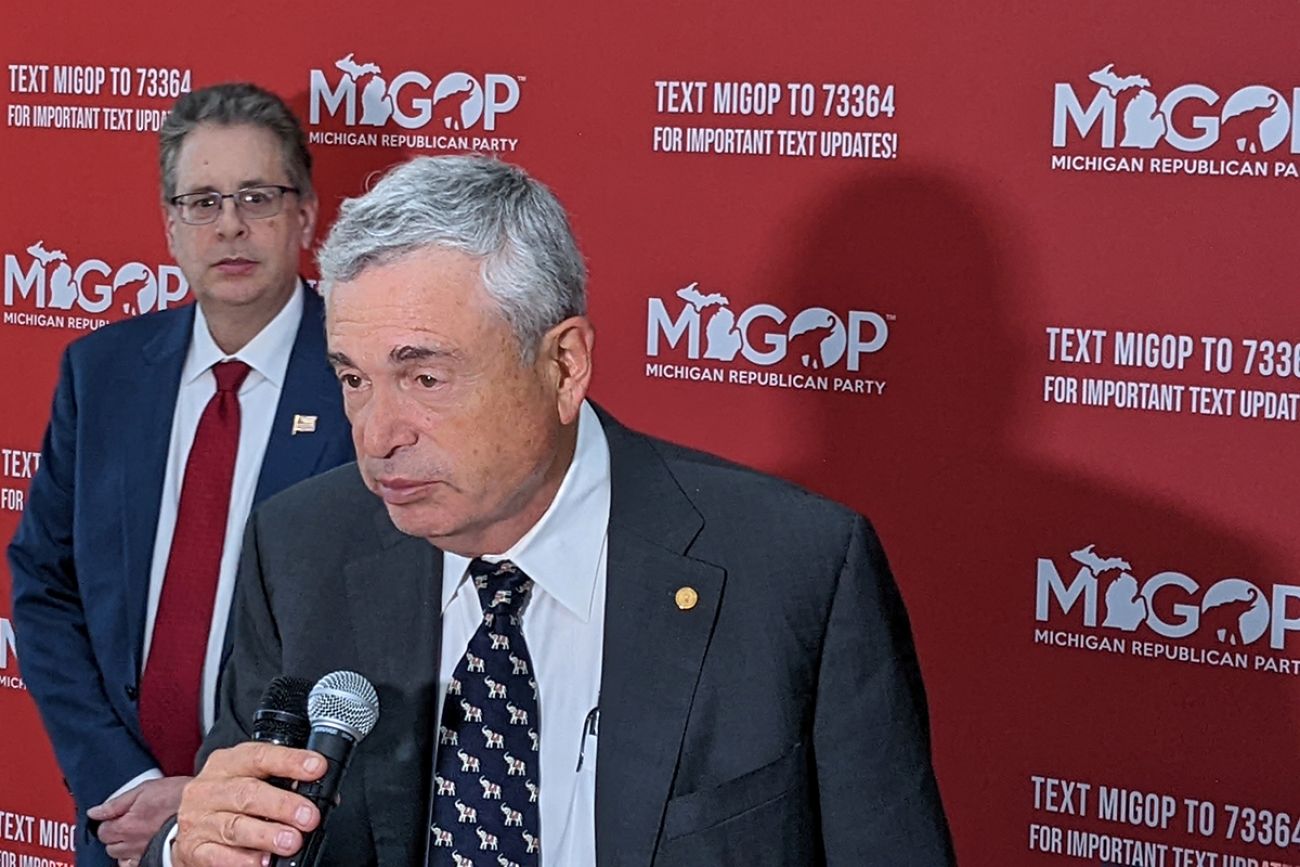Basically broke, Michigan GOP to charge delegates to attend convention

- Michigan GOP approves new convention registration fees
- Party struggling with $2.3 million in state campaign debts
- Official blames financial woes on disconnect with donors
LANSING — The cash-strapped Michigan Republican Party will require delegates to help cover the cost of next month's state convention in Lansing, where they'll gather to decide who will lead the party for the next two years.
The state party's central committee on Thursday voted to change convention rules by imposing a new $50 registration fee on delegates who will be selected at upcoming county conventions.
Delegates who don’t pay by Jan. 26 deadline can still attend the Feb. 17-18 convention in Lansing by paying a $75 same-day registration fee.
Related:
- Right-to-Work repeal just a start: Michigan Democrats eye pro-worker agenda
- Perry Johnson, mulling presidential or U.S. Senate run, plans Super Bowl ad
- Michigan Democrats: Let’s move up presidential primary. GOP: Not so fast
It's the latest sign of financial strain for the Michigan GOP, which last year struggled to raise money from traditional donors after grassroots delegates stormed state conventions to nominate outsider candidates loyal to former President Donald Trump.
The Michigan GOP has traditionally paid the full cost of its conventions, but the new rule "puts us in line with other state parties across the country who require delegates to pay a registration fee to help offset costs of increasingly expensive conventions," spokesperson Elizabeth Stoddart told Bridge Michigan.
The fee proposal passed the state central committee with "a large majority of support" and "ensures long-term financial stability at the party," she said.
Campaign finance records suggest the Michigan GOP is essentially broke despite more than $3.2 million in personal contributions over the last two years from outgoing chair Ron Weiser, a real-estate magnate who is not seeking re-election.
The party last month disclosed more than $2.3 million in outstanding debts in its primary state campaign account, including more than a dozen Comerica Bank loans taken out last year in an attempt to help support candidate campaigns.
The Michigan GOP still had nearly $2 million in a separate federal account, however, after reporting autumn funding infusions from the National Republican Congressional Committee, National Republican Committee and other GOP sources.
In April, Weiser promised to personally raise or donate "the resources needed to be successful" after delegates alienated traditional GOP donors by nominating Trump loyalists Matthew DePerno for attorney general and Kristina Karamo for secretary of state.
Donors threatening to boycott the state party were “sore losers,” he said at the time.
DePerno and Karamo, who are both now running to replace Weiser as Michigan GOP chair, raised far less campaign cash than their Democratic counterparts and lost their general election matchups to incumbent Attorney General Dana Nessel and Secretary of State Jocelyn Benson.
Gubernatorial nominee Tudor Dixon, who won the GOP primary with Trump's endorsement, lost to Democratic Gov. Gretchen Whitmer by nearly 11 percentage points.
"Donors for the most part decided against supporting Trump's hand-picked AG and SOS candidates from the April convention, and also withheld millions in traditional investment into the State Party," Michigan GOP Chief of Staff Paul Cordes wrote in a November post-election memo.
"Countless hours spent courting donors consistently shifted into back and forth about Mar-a-Lago's influence over our process, Party and voters," Cordes said, referring to Trump’s Florida estate.
"All while Democrats raised tens of millions of dollars and invested record amounts statewide and in legislative districts."
Grassroots activists who have reshaped the Michigan GOP in recent years had criticized the proposed $50 fee as a potential deterrent to participation. DePerno, one of 10 people now running for chair, had urged each candidate in the convention race to donate $20,000 to the state party to cover the cost of the event.
“The precinct delegate is the backbone of our party," DePerno wrote last week in a campaign email. "Over the past 2 years, we have elected thousands of new delegates who are still figuring out the convention process and this is simply not fair to them when you consider all we ask of these delegates already."
Weiser made the case for the new registration fees in a recent email to fellow Republicans, writing that it typically costs the party $140,000 to $200,000 to run a state convention, and "it's increasing in price with every convention we do."
By comparison, the Wisconsin GOP charges registration fees of between $45 and $100 for its conventions, Weiser told activists. Illinois charges $50 and Iowa charges $90.
"This cycle, we have had three" state conventions without charging any registration fees, he continued. "This is simply not sustainable, and we must make this change."
See what new members are saying about why they donated to Bridge Michigan:
- “In order for this information to be accurate and unbiased it must be underwritten by its readers, not by special interests.” - Larry S.
- “Not many other media sources report on the topics Bridge does.” - Susan B.
- “Your journalism is outstanding and rare these days.” - Mark S.
If you want to ensure the future of nonpartisan, nonprofit Michigan journalism, please become a member today. You, too, will be asked why you donated and maybe we'll feature your quote next time!




